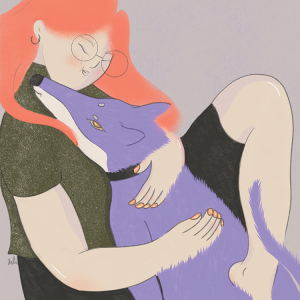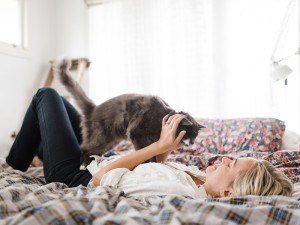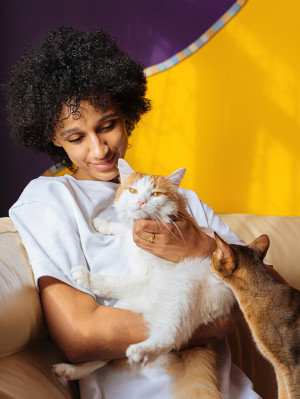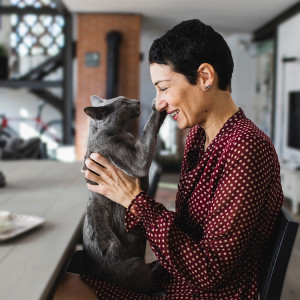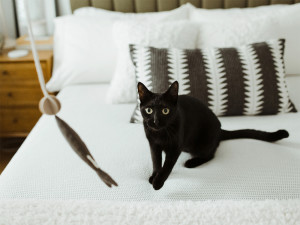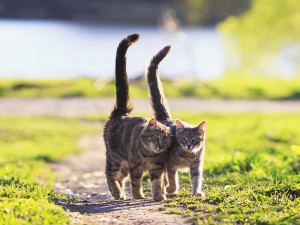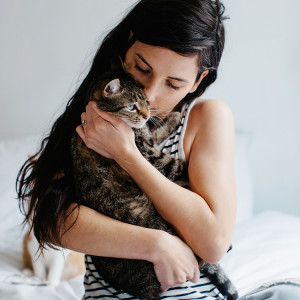Your Cat Can Tell When You’re Stressed, Study Says
It’s all in their noses.
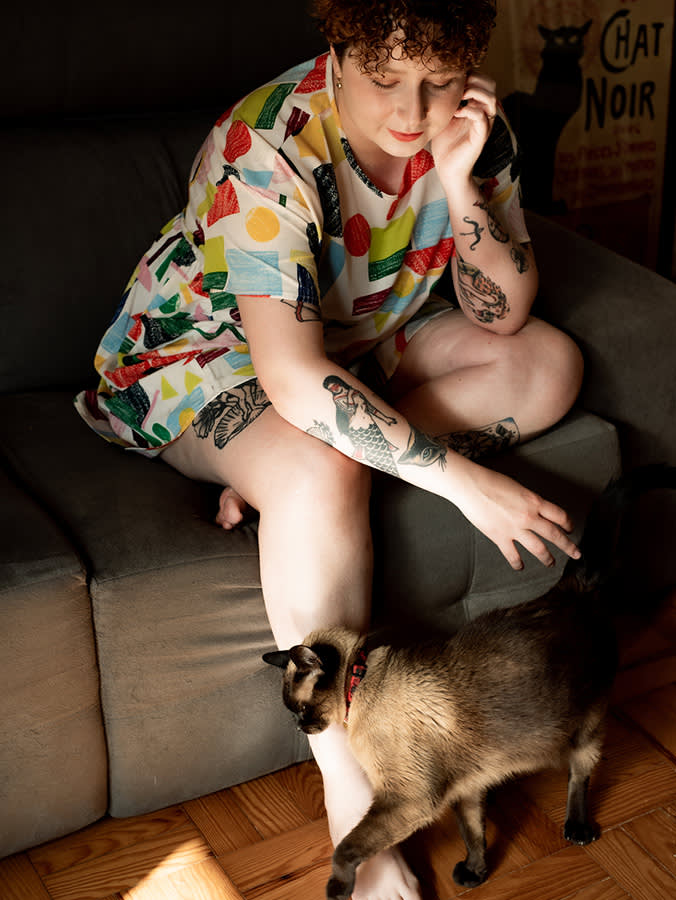
share article
A recent study found that dogs are actually able to tell if a human is stressed or calm based on their scent aloneopens in a new tab. What they choose to do with that information — run and hide, snuggle close, or attempt to initiate play — depends on their training and their relationship with said human. More research needs to be done to determine if they can actually differentiate between different types of stress (i.e., anger, fear, and depression). Still, it’s nice to think that your dog can actually smell how you are feeling and react accordingly, right?
But...what about cats? Do they have what it takes to sniff out and, should they choose to do so, alleviate stress in humans? Dogs have millions more scent receptors than cats, but cats have more than three times as many V1R receptors — those that can actually differentiate between scents — so, in a way, a cat’s nose is even more sensitiveopens in a new tab than a dog’s. But just because a cat is capable of differentiating between scents, doesn’t mean they use this skill to clock human emotions, especially when there are other, more direct means of doing so.
A 2015 studyopens in a new tab found that cats use visual and auditory cues to help determine their human’s emotional state. In the study, cats and their humans entered a room containing a fan with streamers tied to it. The idea was to bring an element of uncertainty and potential anxiety into the room, without putting the cats or people at risk.
Half of the humans were told to speak to their cats in a happy voice while looking back and forth between the cat and the fans. The other half were instructed to speak to their cats in a fearful way. In both cases, 80 percent of cats looked to their owners first before trying to determine how to act towards the fan, and many of the cats actually seemed to base their own behavior on the reactions of their people.
Whether a cat uses scent to help determine a person’s emotional state or not, what they choose to do with that information depends on the cat themself. Some cats are simply less demonstrably affectionate than others, so even if they know you are stressed or upset, they may not take direct action to alleviate your symptoms — at least not in ways you necessarily recognize.
While a more gregarious cat might rub up against you or lovingly knead youopens in a new tab with their paws, a more independent cat might just sit in the room and throw you the occasional slow blink. Both cats, however, are demonstrating their concern for/connection to you — just in different ways.
As far as your cat is concerned, you are a member of their “colonyopens in a new tab,” and it is to their advantage to create and maintain a connection with you and keep an eye on how you are feeling. Your stress can cause them stress because it could result in changes to their routine or a reduction in the amount or quality of the care you give them.
For that reason alone, it is to their advantage to do something to at least try and make you feel better. That might sound manipulative and self-serving, but care and need are not mutually exclusive. In fact, they are intimately linked, in cats and humans alike. And if your cat doesn’t have what it takes to free you from your stress, well, there’s always therapy.

Charles Manning
Charles Manning is an actor, writer, and fashion/media consultant living in New York City with his two cats, Pumpkin and Bear. Follow him on Instagram @charlesemanningopens in a new tab.
Related articles
![A woman with curly black hair sitting in front of a dark purple and yellow backdrop while looking down affectionately at her two cats sitting on her lap]() opens in a new tab
opens in a new tabHow to Build Your New Cat’s Trust in You
If your cat still approaches you with a figurative arched eyebrow of skepticism, try these tricks to put them at ease.
![Short haired woman holding a gray cat that's playfully pawing at her nose]() opens in a new tab
opens in a new tabDoes Your Cat’s Fur Pattern Determine Their Personality?
It’s a little more complicated than that.
![Tattooed and pierced woman wearing a black and white striped shirt and holding an upset looking cat]() opens in a new tab
opens in a new tabIs Your Cat Mad at You, Or Is That Just Their Face?
Cat behaviorist Kristiina Wilson on how to tell if your cat is grumpy — or just kind of like that.
![Black cat staring at a cat toy]() opens in a new tab
opens in a new tabHow to Play With Your Cat
Cat behaviorist Cristin Tamburo’s got a game plan.
![Two cats walking with their tails sticking straight up]() opens in a new tab
opens in a new tabCat Tail Meanings
Cats are enigmas. But their tail movements can reveal a lot about their moods.
![dark-haired woman hugging cat that has imprinted on her]() opens in a new tab
opens in a new tab10 Signs Your Cat Has Imprinted on You
Feeling like you have a little shadow these days? Here’s why that’s happening.
